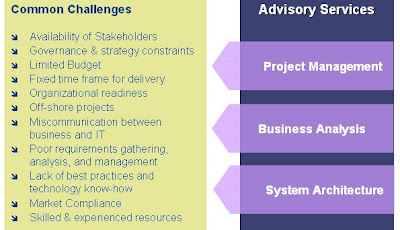Statistics on IT project delivery
Although there has been some improvement on IT project delivery since the Chaos Reports was first published in 1999, the situation has unfortunately not changed dramatically. 2/3 projects are still canceled or challenged, and only a 1/3 are truly successful.
There are also some other statistics which can be found in all kinds of reports:
- $80 -145 billion per year is spent on failed and canceled projects (The Standish Group International, Inc.)
- 60% - 80% of project failures can be attributed directly to poor requirements gathering, analysis, and management (Meta Group)
- 40% of problems are found by end users (Gartner)
- Poorly defined applications have led to a persistent miscommunication between business and IT. This contributes to a 66% project failure rate for these applications (Forrester Research)
Cambridge Technology Partners offers
- Project Management as a service
- Business Analysis as a service
- System Architecture as a service

Projects bring together resources, skills, technology and ideas to achieve business objectives.
Project management helps to ensure that these objectives are achieved for the defined scope within budget, within time and to the required quality.
- CTP is the pioneer of the fixed time / fixed price approach and an early adopter of strong delivery and project management methodologies
- CTP continues to tailor its methodology to new business challenges, including Global Sourcing & Global Testing
- With our knowledge and techniques, CTP can quickly identify, develop and prioritize business requirements.
- With strong facilitation and communication skills CTP can help to close the gap between Business and IT.
- Our experienced system architects at CTP will turn your business requirements into your IT solution.
